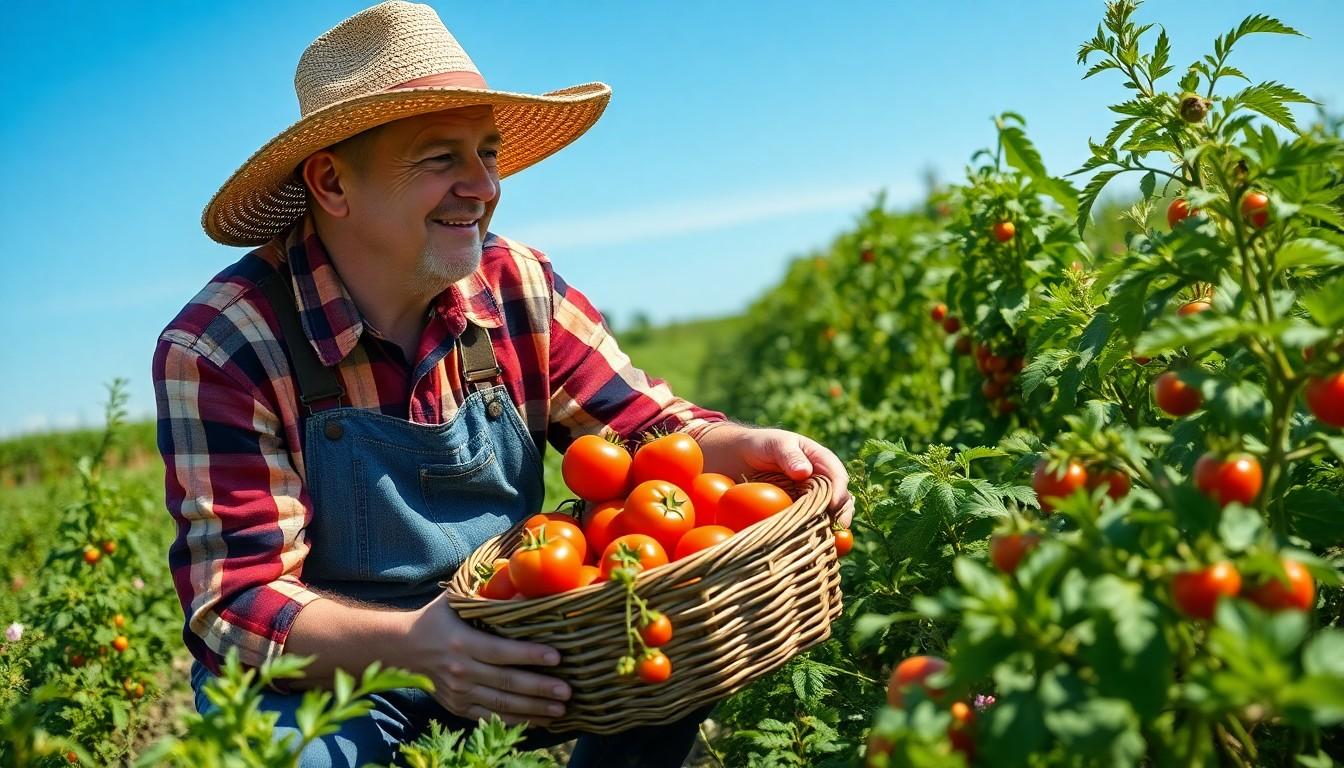The Best Fluffy Pancakes recipe you will fall in love with. Full of tips and tricks to help you make the best pancakes.

In a world where veggies often come with a side of pesticides, organic vegetable farming stands out like a superhero in a cape. It’s not just about growing food; it’s about cultivating a healthier planet and a tastier plate. Imagine biting into a juicy tomato that’s not only bursting with flavor but also free from harmful chemicals. That’s the magic of organic farming!
Organic Vegetable Farming
Organic vegetable farming focuses on growing crops without synthetic fertilizers, pesticides, or genetically modified organisms (GMOs). This farming practice prioritizes soil health, biodiversity, and ecological balance, promoting sustainable agricultural methods.
Farmers utilize natural processes and organic inputs to nourish the soil and support plant growth. Crop rotation, cover cropping, and composting are some essential techniques that enhance soil fertility and reduce pest pressures. These methods contribute to healthier, nutrient-rich vegetables that appeal to consumers seeking quality produce.
Organic vegetables often exhibit superior flavor profiles compared to their conventionally grown counterparts. For instance, tomatoes grown organically tend to possess a sweeter taste, which stems from their natural cultivation methods. Such flavor differences attract consumers seeking a gastronomical experience.
The demand for organic produce has steadily increased over recent years. According to the Organic Trade Association, organic food sales hit $62 billion in 2020, reflecting a growing trend towards healthier eating habits. This surge highlights consumers’ awareness of the benefits of organic vegetables for both personal health and environmental sustainability.
Organic certification systems ensure that farms adhere to strict standards, offering transparency to consumers and assuring them of the quality of their vegetables. Farms achieving organic certification undergo routine inspections, verifying compliance with organic farming practices.
Overall, organic vegetable farming plays a pivotal role in fostering a healthier planet and producing tasty, chemical-free food. Through sustainable practices, it supports not just individual health, but also the well-being of the environment and future generations.
Benefits of Organic Vegetable Farming

Organic vegetable farming offers numerous advantages, promoting a healthier lifestyle and a more sustainable environment. These benefits can be categorized into health, environmental, and economic impacts.
Health Benefits
Organic vegetables contribute to better health by reducing exposure to harmful chemicals. Consumers gain access to produce free from synthetic pesticides and fertilizers, leading to fewer health risks. Organic farming enhances nutrient density in vegetables, providing essential vitamins and minerals. Research shows that organic crops often contain higher levels of antioxidants, supporting overall well-being. Eating organic can lead to tastier meals, as these vegetables typically exhibit robust flavor profiles.
Environmental Benefits
Organic vegetable farming significantly improves environmental health. Practices such as crop rotation and composting enhance soil fertility while conserving water resources. Biodiversity thrives in organic systems, as diverse ecosystems support beneficial insects and pollinators. By avoiding synthetic chemicals, organic farmers protect local water supplies from contamination, promoting healthier ecosystems. Additionally, organic practices reduce greenhouse gas emissions, contributing to climate change mitigation and fostering sustainable agriculture.
Economic Benefits
Organic vegetable farming presents several economic advantages. Organic produce typically commands higher market prices, benefiting farmers financially. The increasing demand for organic foods results in new market opportunities, stimulating local economies. Farmers who adopt organic practices often report lower input costs over time, as they rely on natural solutions. Furthermore, organic farming creates job opportunities in sustainable agriculture, boosting community employment and supporting local food systems.
Challenges in Organic Vegetable Farming
Organic vegetable farming faces several significant challenges. Understanding these difficulties is crucial for successful sustainable practices.
Pest and Disease Management
Pest and disease management poses a notable challenge in organic farming. Organic farmers rely on natural control methods, which can sometimes be less effective than synthetic solutions. Biological controls, such as beneficial insects, provide one avenue for pest management. Farmers often rotate crops to disrupt pest life cycles, but this requires careful planning and implementation. Here, maintaining biodiversity plays a vital role in preventing outbreaks. High pest pressure can still threaten yields, making timely intervention essential. Organic farming lacks quick fixes, demanding proactive strategies to ensure healthy crops.
Soil Fertility
Soil fertility represents another obstacle for organic vegetable farmers. Unlike conventional methods, organic farming refrains from synthetic fertilizers. Enhancing soil health relies on practices like composting and cover cropping. Farmers must regularly monitor soil nutrient levels to assess fertility. Nutrient deficiencies can lead to reduced crop yields and inferior quality produce. Utilizing green manures helps, yet the process requires time to build soil nutrients effectively. Consistent soil management ensures sustainable fertility, emphasizing the need for patience and long-term planning.
Best Practices for Organic Vegetable Farming
Organic vegetable farming benefits greatly from implementing best practices that enhance sustainability and productivity. Farmers who adopt effective methods can improve their crop yields while maintaining soil health.
Crop Rotation
Crop rotation involves systematically changing the type of crops grown in a particular area over seasons. This practice prevents soil depletion by alternating nutrient requirements and reducing pest populations. Rotation disrupts the life cycles of pests and diseases that target specific crops, diminishing their impact. Implementing crop rotation can lead to healthier plants and more resilient agricultural systems. For instance, following legumes with nutrient-demanding vegetables contributes to maintaining soil fertility naturally.
Sustainable Fertilization
Sustainable fertilization employs natural sources to enrich the soil. Organic farmers often utilize compost, green manure, and organic matter to enhance nutrient content. Incorporating cover crops into the farming cycle boosts soil health and prevents erosion. It also improves water retention, which is crucial during dry spells. Effective fertilization results in nutrient-dense vegetables, contributing to higher quality produce for consumers. Utilizing these organic practices fosters balanced ecosystems while supporting higher crop yields.
Stimulates Local Economies
Organic vegetable farming stands out as a vital practice that not only benefits individual health but also nurtures the environment. By prioritizing natural methods and sustainable techniques, it cultivates nutrient-rich produce that enhances flavor and reduces harmful chemical exposure.
As consumer demand for organic options continues to rise, the importance of supporting local organic farms becomes increasingly clear. This movement not only stimulates local economies but also contributes to a healthier planet.
Embracing organic farming is more than just a trend; it’s a commitment to a sustainable future that values quality, health, and ecological balance. The journey toward a greener world starts with informed choices about the food on our plates.
